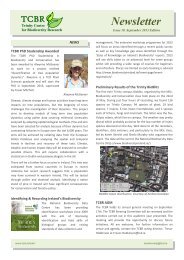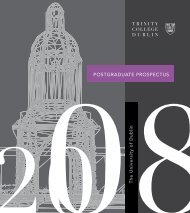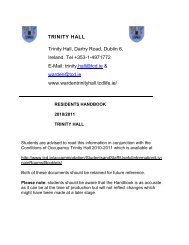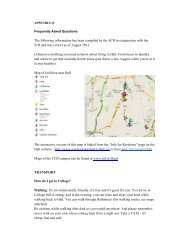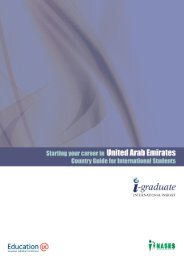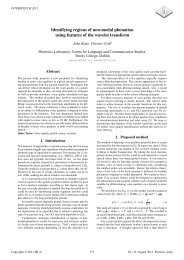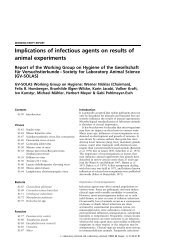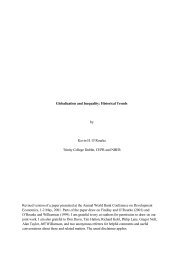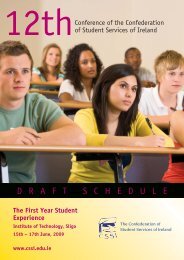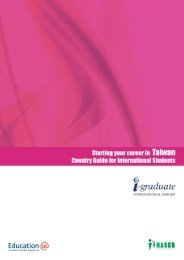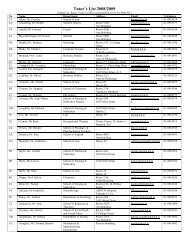Conference Programme (PDF, 1019KB) - Trinity College Dublin
Conference Programme (PDF, 1019KB) - Trinity College Dublin
Conference Programme (PDF, 1019KB) - Trinity College Dublin
You also want an ePaper? Increase the reach of your titles
YUMPU automatically turns print PDFs into web optimized ePapers that Google loves.
abstracts by stream and session<br />
SESSION 6e Young Asylum Seekers and Refugees<br />
Refugee and Asylum Seeking Children: Emerging Paradigms in Research and Practice<br />
Charles Watters, Rutgers University, USA<br />
In recent years the treatment of children seeking asylum in industrialised countries has been a matter of increasing international<br />
concern. Human rights organisations have documented numerous instances of summary expulsion or abandonment of those trying to<br />
cross borders in the hope of a more secure existence. Drawing on material from his recent book Refugee Children: Towards the Next<br />
Horizon, and a number of his recent studies of the treatment of asylum seeking and refugee children in Europe, Watters argues that<br />
decisions regarding the expulsion or incorporation of children are frequently governed by a moral economy in which children viewed as<br />
suffering from health problems, specifically mental health problems, are deemed to be legitimate and deserving of social and political<br />
support. Those who do not achieve a form of `bio-legitimacy’ are often viewed as undeserving and are excluded or expelled. In amplifying<br />
his theme, Watters will draw on current fieldwork in the Mediterranean region where children often arrive in Southern Europe having<br />
travelled over land and sea from highly unstable war torn regions, and from Northern European ports where further journeys may be<br />
attempted to the UK. In examining the treatment of asylum seeking and refugee children he will draw on his recent study of reception<br />
conditions for asylum seekers in sixteen European countries. In developing theoretical perspectives that draw on the work of Arendt and<br />
Agamben among others, Watters argues for an approach to research in the field that critically examines the historical, political and social<br />
contexts in which children are excluded from territories or incorporated in the context of emerging epistemologies of care. He will also<br />
argue that a research framework that engages with a wide social and political context is an essential component in developing receptive<br />
and responsive policies towards asylum seeking and refugee children.<br />
The Pre-departure Lives of Unaccompanied Minors: the “Ordinary” Amidst the “Extraordinary”<br />
Muireann Ní Raghallaigh, University <strong>College</strong> <strong>Dublin</strong>, Ireland<br />
Our knowledge of the pre-departure lives of unaccompanied minors – and indeed other asylum seekers and refugees – is often limited<br />
to accounts of difficulties and problems. As a result, the impression is given that somewhat ‘extraordinary’ experiences – of war,<br />
poverty, and lack of opportunity – fully represent these young people’s lives. Life at home is seen as negative, dangerous, and lacking in<br />
opportunities, whilst life in the host country is seen in a more positive light, representing safety and possibility. However, such accounts do<br />
not give the full story. ‘Thicker stories’ are often present (Kohli, 2006). By deliberately not focusing on problems at home and on reasons<br />
for departure, the research on which this paper is based allowed the participants to talk about what might be termed their more ‘ordinary’<br />
circumstances of childhood and adolescence, many of which were positive in nature. Although frequently neglected in the literature, these<br />
circumstances are important to understand if we are to seek to fully appreciate where these young people have come from and to what<br />
extent their lives have changed as a result of leaving home.<br />
Supporting social inclusion for refugee youth<br />
*Karen Block, University of Melbourne, Australia<br />
Elisha Riggs, University of Melbourne, Australia<br />
Lisa Gibbs, University of Melbourne, Australia<br />
Deborah Warr, University of Melbourne, Australia<br />
Australia accepts approximately 13,500 refugee and humanitarian migrants yearly, over half of whom are under the age of 25.<br />
Currently, the majority of humanitarian entrants arriving in Australia are from countries in Africa, the Middle East and Burma which<br />
have experienced long periods of conflict and consequent displacement of populations. This background results in particular barriers<br />
to inclusion for young refugees who have often spent long periods of time, and sometimes their whole lives in refugee camps, as well<br />
as having experienced a significant degree of trauma. Many adolescent and young adult refugees arrive with significantly disrupted<br />
family and social networks as well as little formal education, compounded by limited vocational skills, work histories or experiences<br />
relevant to employment in Australia. Standard on-arrival programs provide twelve months of English language tuition before placement<br />
in mainstream education systems, where a mismatch of age, educational level and experience leaves individuals at high risk of<br />
disengagement, dropping-out, and subsequent welfare dependency leading to long term social exclusion.<br />
This paper will present findings from focus groups and interviews with young people from refugee backgrounds who are participating<br />
in an innovative intervention designed to improve settlement outcomes for this group. The Ucan2 program is situated within standard<br />
on-arrival English language programs. It brings host-community volunteers into the language classroom and promotes part-time work<br />
as a means to inclusion and engagement. The intervention provides participants with psychosocial support and relevant experiences in<br />
terms of employment focused language acquisition and employment skills while promoting social networking beyond existing community<br />
boundaries. The research focus is on experiences of resettlement and social connections generated through program participation as<br />
well as education and employment expectations, aspirations and outcomes. The presentation aims to enhance our understanding of the<br />
issues impacting on social inclusion for newly-arrived young adult and adolescent refugees in Australia and other developed countries<br />
and how this can inform policy and program development relating to service provision for this population.<br />
73



